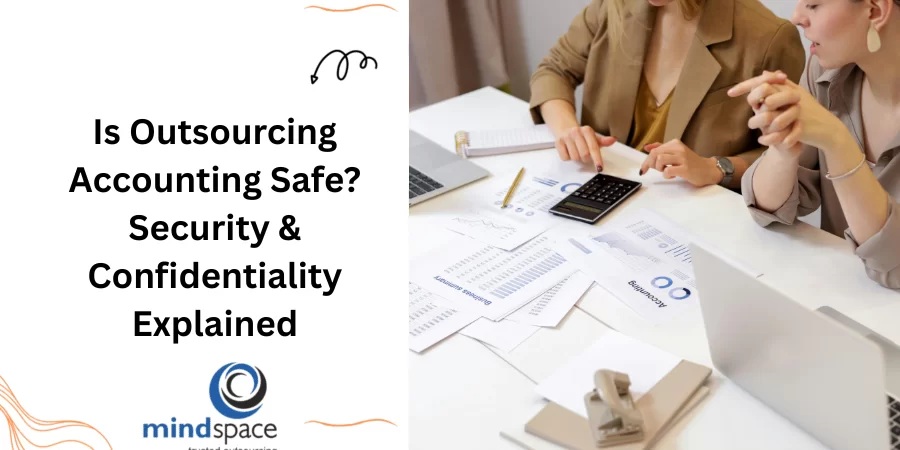Is Outsourcing Accounting Safe? Security & Confidentiality Explained
For businesses aiming to stay lean, efficient, and cost-effective, outsourcing non-core functions is now routine. Among these, accounting and bookkeeping services are often the first to be outsourced. Still, concerns around data privacy, fraud risk, and control can make decision-makers pause. Is outsourcing accounting truly safe? The answer lies in understanding the processes, technologies, and controls used by accounting outsourcing firms to secure financial information.
Why Businesses Choose to Outsource Bookkeeping and Accounting?
Outsourcing offers more than just cost savings. For growing businesses, it brings access to skilled professionals, streamlined workflows, and scalable solutions—without the overheads. When bookkeeping is outsourced to a reputable provider, it allows internal teams to shift focus from data entry and reconciliations to strategic planning and decision-making.
But this shift in operations also raises a valid concern—how is sensitive financial data handled when accounting services are managed online?
How Accounting Outsourcing Firms Protect Data?
Reputable firms in the industry don’t just focus on delivering accurate numbers; they build their processes around robust security frameworks. Here’s how outsourced accounting services typically ensure data security:
1. Secure Infrastructure and Encryption Protocols
Leading firms use encrypted communication channels (SSL/TLS) for data transfer, ensuring that sensitive documents aren’t vulnerable during transmission. Cloud storage with end-to-end encryption further ensures that data is only accessible to authorised personnel.
2. Role-Based Access Controls
Access to financial data is restricted based on job functions. This principle of “least privilege” reduces the chances of internal misuse and keeps client information compartmentalised.
Suggest Read: 10 Signs It’s Time to Outsource Your Business Bookkeeping
3. Compliance with Global Data Standards
Firms offering accounting and bookkeeping services often adhere to standards like GDPR, SOC 2, and ISO 27001. These standards govern how personal and financial data is collected, stored, accessed, and disposed of.
4. Routine Audits and System Monitoring
Advanced monitoring tools detect and flag suspicious activity in real time. Periodic audits ensure that internal processes remain aligned with industry best practices and compliance norms.
Risks Associated with Outsourced Accounting—and How They’re Managed
No system is entirely risk-free, but responsible accounting outsourcing firms are transparent about potential threats and how they’re mitigated.
1. Confidentiality Concerns
Clients often worry about unauthorised sharing of sensitive financial data. To manage this, firms implement strict non-disclosure agreements and background checks on employees.
2. Third-Party Exposure
When outsourcing bookkeeping, data may pass through third-party platforms or tools. Trustworthy firms vet all software vendors carefully and use only those that comply with strict data protection laws.
3. Fraud and Internal Misuse
Outsourced accounting services are not immune to fraud, but layered controls—like multi-user verification, audit trails, and restricted access—significantly lower the risk.
Suggested Read: From Startup to Success: How Bookkeeping Services Fuel Growth
Why Choosing the Right Partner Matters?
Outsourcing accounting services isn’t just about handing off the numbers—it’s about finding a partner who values confidentiality and accountability. Firms that specialise in accounting service online often have dedicated compliance officers, secure client portals, and tailored onboarding processes to understand each client’s risk profile.
Transparency is key. The best accounting outsourcing firms offer clear SLAs, detailed contracts, and real-time access to reports and documents.
Key Takeaways: Is It Safe to Outsource Bookkeeping?
When handled by a reputable firm, bookkeeping outsourced to professionals can be even safer than managing it in-house. Strong data policies, digital controls, and accountability mechanisms make outsourcing a secure and practical option for businesses of all sizes.
Conclusion
Security and confidentiality are no longer just “added benefits”—they’re core expectations when partnering with any service provider. In the case of accounting and bookkeeping services, reliable outsourcing firms invest heavily in keeping client data protected. With the right systems and a trustworthy partner, outsourcing isn’t just safe—it’s smart.
FAQs
Are outsourced accounting services safe for small businesses?
Yes, especially when managed by certified firms that use encrypted tools and comply with international data protection regulations.
How do accounting outsourcing firms maintain confidentiality?
Through NDAs, employee vetting, access controls, and secure platforms that track who accesses data and when.
What if something goes wrong with an outsourced accounting firm?
Well-defined contracts and SLAs typically cover dispute resolution, data recovery, and accountability, reducing business risk.
Is cloud-based accounting service online secure?
Yes, when using platforms with robust encryption, two-factor authentication, and compliance certifications like SOC 2 or ISO 27001.


